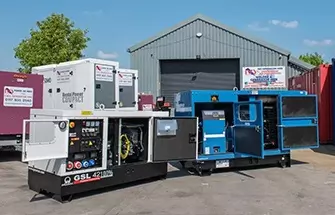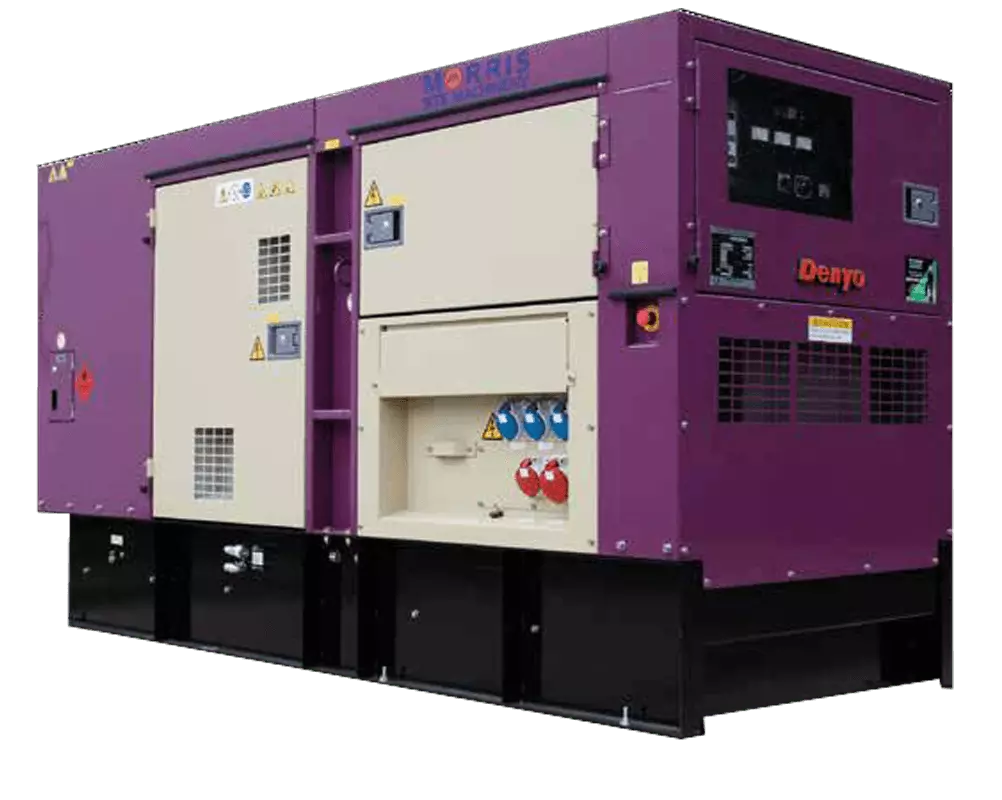A common question about power generators is: What generator will provide emergency power to a house? We discuss below, the types of generators available and which is the most suitable for powering a house during an emergency outage.
What Kind of Generator Do I Need For a Power Outage?
Different appliances and generators can power your home. Three primary types of generators can do so, and they are Portable generators, Inverter generators and home standby generators.
Portable Generator
Powered chiefly by fuel, gasoline or diesel, they can put off quite an extensive range of emergency power. You may use a portable generator to run large electrical appliances like refrigerators and televisions but only as a temporary fix or solution.
More prolonged outages call for a more powerful generator.Portable generators can be rather powerful; however, hard-wired appliances like many AC units cannot use the power from a mobile unit generator without any manual transfer switch installed.
To install a manual automatic transfer switch onto your portable generator, you will likely need the assistance of an industry professional. The average overall price of a portable generator is roughly around £1500.
£ 1,500/ avg
Inverter Generator
Inverter generators use engines and alternators to provide and create AC power. You may also use rectifiers to convert from AC power into DC power.
Inverter generators tend to be very small so that they can easily fit into your car for portable charges and convenience.
They are highly ideal for quick charge needs and devices such as allowing battery power for your laptop or phone and juicing up car batteries.
As this is the case, inverters are not the best generator options for powering your entire household appliances; they work far better in motion and for smaller devices. The inverter generators average price is roughly around £200-£220.
£ 210/ avg
Standby Generator
Commonly known as the whole-house standby generator, this generator can operate off natural gas or liquid propane. Doing so will automatically transfer electricity to your appliances during a backup power outage.
Best used for emergency backups, standby generators can provide utility energy during prolonged blackouts that last several hours when you are in dire need of an immediate surge of energy for the peak performance of your appliances and electricals.
£ 2,200/ avg
Propane or gas-fuelled standby generators are used both commercially and domestically. Hospitals have standby generators on deck at all times to ensure that all their necessary and vital machinery will continue to function during the event of an emergency or sudden power outages through harsh weather or bad signals. The average natural gas standby generator usually costs around £2200.
Portable Generators vs Standby Generators for Your Home:
You may find yourself wondering, what is the best domestic generator most suitable for your home or property?
Portable
Portable generators are great, and they are mobile enough to carry or take them anywhere you wish. They could be taken with you to power a motorhome on quick weekend travels or getaways or take on a boat for a fun trip. Portable generators have enough charge on them to energise your household when necessary or for temporary backup during sudden moments when the power goes.
Standby
However, if you feel your home will need prolonged backup power for more than a few hours, it is perhaps best to invest in a home standby generator. You will require quite a large amount of fuel to keep your electricals and portable generator running for extended periods of time unless you intend on a professional installation of a manual automatic transfer switch.
Suppose you are suffering from a lack of heat or air conditioning, especially during power blackouts. In that case, you may wish to have an installation of a manual transfer switch panel by a professional or specialist. You should be aware that this would increase the overall cost of the portable charger.
If you are interested in this kind of instalment or are searching for further advice or info, contact us via the phone number or email address on our webpage at IWS Generator Hire. Our in-store experts will happily offer our support and assistance.
How to Calculate Watts to Generator Sizing
Regardless of whatever type of generator you eventually select for your home, it is vital to find the appropriate size to fit your specific energy needs for all your family or housemates. Generators are sized based on their electrical output power supply, which you often measure in watts.
As mentioned above, the three primary categories of generators (portable, inverter and standby) all have a wide range in size from around 700 watts up to 18,000 watts. Generators with much higher wattages and kilowatts are most suitable for job-sites, construction work, and commercial use.
Typically, the most accurate way to pick the generator more appropriate and convenient for you, your home, or your workplace property is to determine which appliances you want it connected to.
Add the necessary wattage of each device together to give yourself an idea and understanding of how much power and energy your generator will need.

How Big a Generator Do you need to power a house?
Some of the most common questions asked about generators are how big do the generators have to be? What size is most suitable enough to run a refrigerator and freezer? How many watts does it take to power a MIG sump pump, welder or compressor? And will an emergency generator have enough energy to power the lights and appliances in a home?
For more domestic uses and generators to power your whole household, you need much more electricity and, therefore, a higher wattage to run multiple appliances all around your home, instead of the small amount of energy used by a portable generator.
Large dual-fuel 10000-watt units are among the best choices for homeowners as they can provide enough energy all-round. If you search for an emergency generator to power up your motorhome, there are many different models available; a quiet 3000-watt inverter generator will provide a power supply for so many devices inside your caravan or family motorhomes such as AC, TV, lights circuits and the fridge.
Maintaining Your Emergency Generator
1.
To keep your emergency generator running, it is essential to up-keep annual or regular maintenance, just like you would any other system or appliance you own.
A little TLC for your generator or power applicants can go a long way and ensure that it will function properly, especially in moments of power shortage or outages when you find that you need it the most. To ensure you are giving proper maintenance to your generator, clean and filter the fuel you are currently using.
2.
After more than a week of usage, the fuel degradation of your generator can clog and filter your fuel lines. When fuel clogs and filters, it is difficult to flow efficiently to your electronics to charge or power them.
To avoid any damage done to your systems and adding to harmful carbon usage, you can clean the fuel inside your generator using external filters.
3.
Whilst this can all be done by you, standby generators work a little differently and require professional maintenance services for your equipment.
When a standby generator experiences filtering or clogging, it can attract moisture and cause far more damage to the equipment; if this occurs, you must report it to a specialist so that they may fix the problem and provide related solutions to follow for the future.
4.
Check your coolant levels. When you maintain units like your air conditioning unit, the cooling system in your generator needs much care and maintenance. To do so, you must frequently check the coolant level on its system periodically. It's best to do checks when the generator is down or is low in power.
5.
Lastly, a more obvious way to check on your generator is by testing the batteries. For standby generators, battery issues can often cause plenty of power failures for your system.
To minimise these issues, you can begin by frequently checking your battery power; to ensure they are charged and cleaned. You may also wish to run tests to confirm the electrolyte levels of your battery to decipher their current status or rank.
If you seek further professional maintenance services, contact us today by phone, the form on our webpage or email, and we can provide a free quote and any additional details you may require.
We hope this article helped you with understanding the best generators to provide emergency power to a house. If you are looking for reliable generators for sale, we provide the best brands with UK wide delivery.





